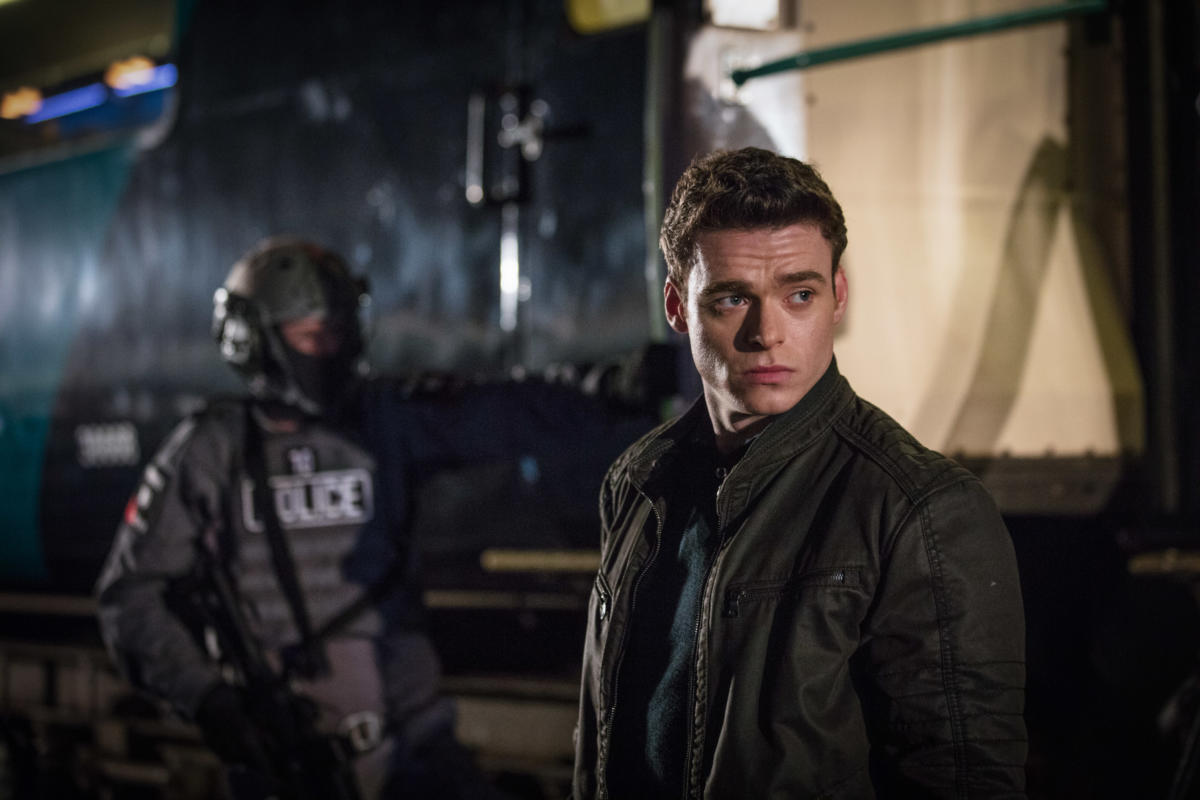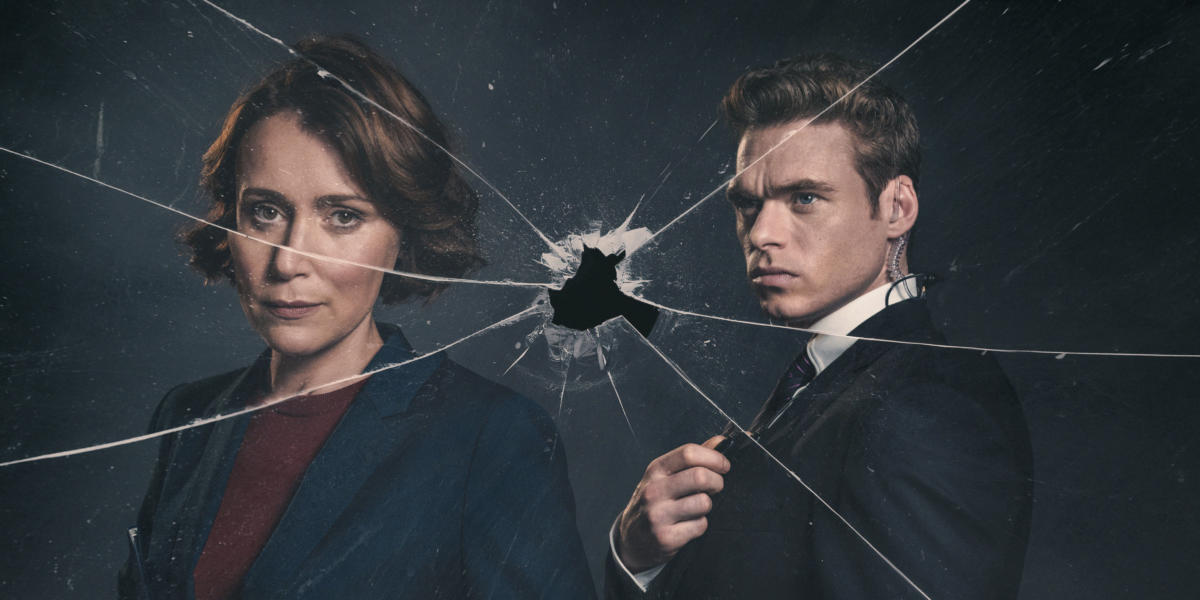The BBC series Bodyguard airs in the States later this month. I’m choosing to drop my review of it now as an act of petty revenge against our colonial cousins for getting Killing Eve months before we did.
Which is odd, when you think about it. Of the two, Killing Eve is far more British, with its luminous continental locals contrasted with rainy old London, and its American lead Sandra Oh somehow managing to make UK colloquialisms like ‘quid’, ‘knob’, and ‘I’m so tired’ sound natural (to say nothing of most of the main characters being at least bi-curious). Bodyguard, on the other hand, is subtly but definitively drawing on the American terrorism classic 24, particularly in the first couple of episodes, which see terrorist attacks of gradually increasing intensity.
24, if you remember, eventually went too far when its sixth season saw a nuclear explosion take out most of Los Angeles, something that’s hard to top without rolling out the Norse gods to finally fight the ice giants. Bodyguard is more restrained, and that’s for the better – of its bombings, none have a greater than single-figure body count, relying on their locations and targets to imbue them with significance.
It does, however, still have something of 24’s grandiose nature. In the face of its glossy-gritty London realism, having jihadis footling around with fancy-Dan pressure sensors and rooftop snipers seems suspicious off the bat, since the vast majority of recent European terrorist attacks have been lone-wolf dimwits getting in a car and mowing down random pedestrians, often without even the courtesy of wrapping themselves in explosives.
At least, unlike 24, it typically doesn’t stray into the kind of black-and-white casting where anyone darker than a paper bag isn’t to be trusted – indeed, this is a major source of tension midway through the series, when after a major bombing a South Asian Home Office advisor immediately comes under suspicion for unspoken but obvious reasons. Here, Islamist terrorism is merely one faction among many, which is good, because it couldn’t have carried the series on its own.
On that token, halfway through the series, organised crime is introduced as a faction – and somehow comes off even weaker. There is always a temptation to get bogged down in voyeuristic material about Laaahndan gaaahngstahs if the chance arises, but Bodyguard has the exact opposite problem. Its mobsters are practically ethereal, engaged in nothing beyond non-specific crime, and beyond that confused – inexplicably, we see the head of an international criminal empire personally head out in the dead of night to settle a score. (They could have done well to learn from Layer Cake, the 2004 film that pretty much single-handedly got Daniel Craig the role of James Bond.)
The meat of it comes in the internal machinations of the state, the uneasy triumvirate of the politicians, the police, and the security services, who require very little prodding to be at each others’ throats as much as they are any given external threat. Their subtly different cultures are exemplified by how the police and the Home Office are headed by women – hardnosed women, but women nonetheless – while the security services, that much less beholden to public opinion and changing times, almost exclusively only trust posh white men in speaking roles.
Richard Madden (previously Robb Stark in Game of Thrones) is excellent throughout as the titular bodyguard – if anything, a bit too good. Given his hypercompetence and the fact he’s nearly always proved right, it’s hard to see why exactly his wife left him beyond to give him the obligatory troubled-cop background. And as television’s troubled cops go, he seems to have his drinking firmly under control.
Nevertheless, troubled he is. In the light of Bodyguard it’s amazing that Kit Harrington is the Thrones star with a reputation for looking broody, since Madden spends a lot of the time with a face – justifiably – like a slapped arse. There are many long, long sequences of him suffering through as horrible stuff happens to him that get genuinely tough to watch – and that’s speaking as someone who chuckled through most of Cannibal Holocaust.

Keeley Hawes is, likewise, bang-on as the Home Secretary he’s sworn to protect. The main flaw is that she’s distinctly more likable than her real-life counterpart Theresa May, who actually succeeded in worming her way up to being Prime Minister. Hawes and Madden’s chemistry, while not-world-beating, just about sells how quickly Madden’s character forgets about her repugnant policies.
(I fully realise I have my biases and bigotry on display here. Fans of authoritarianism may well delight in her performance as the pretty face of creeping state power, wondering ‘why can’t she really be the Home Sec, she’ll sort everyone out…’)
The rest of the cast are largely unremarkable, but solid enough – all the main representatives of the security services are played by people cadaverous enough to make Peter Cushing proud, and Vincent Franklin is impressively slimy as Hawes’s ambitious understudy. Franklin is no stranger to fictional Conservative politics, having appeared as the hippy-dippy Tory spin doctor in The Thick Of It – though sad to say, here he doesn’t get any lines nearly as iconic as his swansong from that show, where he decried his party as having been ‘built on a solid bed of cunts’.
Which is, perhaps, an apt description of London’s establishments as a whole in the world of Bodyguard. Above middle-management level, every character we meet is either amorally power-hungry or vicious and resentful, and very often both. This works well in the murk of the investigation, and when it transpires there is a leak within the police, both the characters and the viewer find themselves spoiled for choice in looking for suspects.
The wheels begin to come off a bit at the end – the final episode weighs in an hour and a quarter, and it needed at least that for the sheer volume of plot threads still dangling. Still, certain parts drag on further than they needed to, while others are swept past alarmingly quickly. The longest sequence, with Madden placed in an utterly excruciating position, do succeed in ratcheting up the tension and the pathos to unbearable levels, but eventually one cannot help but question if it’s all worth it.
(That said, I wouldn’t be too surprised to learn there was only two minutes of it, and my position on the edge of my seat had messed with the passage of time.)
There is one final revelation (concerning a leak about Madden’s children) which was clearly meant as one last shocking twist, but only succeeds in undercutting the first episode, and is particularly disappointing as there was at least one candidate in the mix who would have made for a more interesting conclusion, and certainly a morally greyer one. As it is, after six hours of power struggles and moral ambiguity, everything wraps up neatly and they all drink lemonade – not literally, but it still feels like an alarming misstep.
Then again, they don’t all turn out to be Chinatown. And Madden’s character, it must be said, stays impenetrable enough that to have a clear-cut conclusion is on one level necessary. While Bodyguard is being billed as a thriller, at its core it’s that old favourite of the British isles, the police procedural – and crucially, even when it’s just going through the procedures, it stays engaging.
Some of the coverage you find on Cultured Vultures contains affiliate links, which provide us with small commissions based on purchases made from visiting our site.



